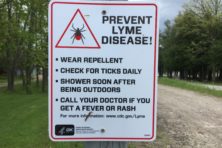Article posted Thursday, August 19, 2010 10:48pm
- Share
- Tweet
- Pin
- Share
“Why Is It…?” was designed by Dr. Steiner to address readers’ questions about human behavior from a social psychological perspective in order to inform and stimulate dialogue about the ways in which our thoughts, feelings and behaviors are influenced by the presence of other people. Dr. Steiner holds a Ph.D. in Applied Social Psychology. In addition to working as a university educator over the last 17 years, she conducts individual and group consultations in matters of social relationships and behavior. Readers are invited to submit their questions anonymously in one paragraph or less to Dr. Steiner at [email protected].
Q: Why is it that people value human life more than animal life? I just read that Door County Memorial Hospital has dedicated four additions to their facility since 2003, while the Door County Humane Society still struggles to operate under cramped and inadequate conditions. Why can’t we provide decent care for the humans and animals in our community?
A: For readers who may have missed the August 7, 2010 issue of the Door County Advocate, the two front-page features juxtaposed a striking contrast in social values.
The headline column described how the Humane Society has been diligently working to care for hundreds of unwanted, abused, and abandoned pets in a facility that was designed to serve 28 cats and 28 dogs. Due to their compassionate “no kill” policy, the animals and staff of the shelter have been laboring under the strain of inadequate space, while attempting to raise funds for a desperately needed expansion.
Just below this headlined feature was an article that announced the celebration of, yet, a fourth addition to Door County Memorial Hospital. This latest addition boasts a “31,000 square-foot project that is the largest in the hospital’s history” – while in contrast, the Humane Society is seeking a meager 7,000 square-foot addition.
On face value, it’s obvious that our society simply places a higher value and status on the lives and well-being of human vs. non-human animals – as evidenced by our social sanctioning and participation in industrial farming, hunting, casual reactions to road kill, and the overall displacement of and disregard for the plight of animals.
But when examined critically, the issue is really one of social morality and reflects the same personality traits of dominance, neglect, and perceived entitlement exhibited by those that engage in the oppression and/or abuse of others. It’s not my intent to say that caring for a loved-one’s medical needs isn’t important. Assuredly it is. However, the operative word underlying this sentiment is “caring.” At what point does “caring” for another life begin and end?
As children, we’re presented with a myriad of “warm and fuzzy” animals to adore – stuffed animals, cartoon animals, puppies and kittens. And who among us was unscathed by the death of Bambi’s mother? But as we mature, we’re socialized to distinguish between “caring” about animals vs. “caring” about humans. We’re taught that the basic needs of humans simply out-weigh animal needs – and thus the mold is cast.
Interestingly, the column on the hospital’s expansion described how Auxiliary Bishop Morneau blessed the new addition with holy water and quoted the Gospel – “I was hungry and you gave me food” (Matthew 25:31-40). And in describing the primary goal of Ministry Health Care’s plan, Morneau beautifully espoused, “a call to justice…promoting and protecting the rights of others…reaching out with compassion and care to those that are ill and in distress.” And while these sentiments are deeply profound and reflect the loftiest of spiritual attributes – why aren’t these same principles of morality extended to the hungry, ill, and distressed lives housed at our only animal shelter?
People frequently quote biblical scripture when rationalizing their notion of privileged human status as a justification for the neglect or devaluation of animals; Genesis 1:26. – “Let us make man in our image, and let them rule over the fish of the sea and the birds of the air, over the livestock, over all the earth and over all the creatures that move along the ground.” However, many contemporary religious scholars argue that the word “rule” refers to our human responsibility as stewards, guardians and protectors of animals and nature rather than a license for dominance, entitlement and neglect.
If of the mindset that biblical instruction is meant to guide our behavior, then consider Job 12:7-10. “But ask the animals, and they will teach you…In His hand is the life of every creature and the breath of all mankind.” And in Genesis 6:19-21, instructions to Noah stated, “You are to take every kind of food that is to be eaten and store it away as food for you and them.”
We cannot, in good conscience, rejoice in the benefits of our own medical affluence and expansions – while neglecting to care for those lives that remain hungry, ill and distressed, due to, and pending our action. It’s within our charge to consider all life on earth as sacred. Indeed, “The greatness of a nation, and its moral progress, can be judged by the way its animals are treated” (Gandhi).

